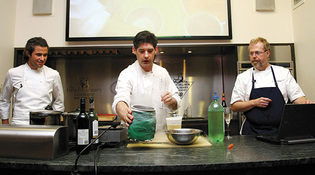 loading
loading
featuresDave Arnold: the mad scientist of foodDave Arnold ’93 cooks turkeys from the inside out, has created a centrifuge for the home kitchen, and at least once set himself on fire.  Neilson Barnard/Getty Images for the International Culinary CenterDave Arnold ’93 (center) is a nonstop inventor of wild food experiments. View full imageIt’s difficult to interview Dave Arnold ’93, because—and he’ll be the first to admit this—he can be a bit scattered. One minute he’s talking about using an industrial-scale centrifuge to make cocktails, the next he’ll be discussing one of his products, a Searzall, a propane torch that converts into a hand-held broiler. Then, while the listener is trying to process that, he’s moved on to a recent trip to China; he was just there, for a single day, to meet a manufacturer about a new product he’s launching. Then he’s explaining a process called “quick-agar clarification,” which apparently can be used to make a very, very tasty gin and tonic. He’s often called a mad scientist, and with reason. But he’s not exactly a scientist. He’s a food-and-drink experimenter. He uses lab equipment—rotary evaporators, ultrasonic homogenizers, immersion circulators—to come up with new and tastier dishes and cocktails. And other innovations: he once cooked a Thanksgiving turkey by tearing out its skeleton and inserting aluminum tubes, which he flushed with boiling oil, cooking the bird from the inside. (He says it was the best turkey he ever had.) Liquid nitrogen is also a frequent tool. Like any self-respecting lab rat, he has set himself on fire. “Pretty badly, in fact,” he says. This passion for food experimentation and technology has served him well. He’s owned a creative-cocktails bar, Booker and Dax (now closed), named after his two sons. He published a book about mixed drinks (Liquid Intelligence: The Art and Science of the Perfect Cocktail). He founded the Brooklyn-based Museum of Food and Drink, which is dedicated to exhibits on the culture and history of food. He’s an associate dean at the International Culinary Center in New York City. And he hosts a podcast, Cooking Issues, on which he answers food questions from listeners. It broadcasts from the back of a pizza shop in Brooklyn. “I guess I like analyzing things,” he ruminates. “That’s always the way I worked with everything.” When Arnold first came to Yale, it was to study science. But reality hit. “It turns out that while you can daydream and not study in high school physics, you can’t really do that in the accelerated math and physics program at Yale,” he says. So he decided to major in philosophy, a field in which, in his words, “it was OK to space out.” Somewhere along the way, he discovered a love for art, as well as a different passion: his future wife, Jennifer Carpenter ’92, an architect. After Yale, he worked as a paralegal and as a performance artist. Eventually, he became friends with (and later, brother-in-law of) the innovative chef Wylie Dufresne. Arnold helped Dufresne procure old lab equipment to experiment with new food preparation techniques. He also began writing about food, and caught the attention of the late Michael Batterberry, founder of Food Arts Magazine, who served as a mentor. Arnold soon became famous for his wild food and drink experiments. Today, his podcasts and presentations are widely available on the Internet, and his products are for sale under the Booker and Dax name; his latest gadget is a centrifuge designed specifically for the kitchen and bar. Arnold says he’ll be opening a new bar soon with a partner, and is writing a new book about sous-vide cooking, a process in which food is placed in vacuum-sealed pouches and cooked in hot water or steam at low temperatures. The project is apparently making him nervous: “It’s already due,” he says. Does Arnold always operate on this level of mania? Actually, yes. He says that working in a kind of chaos is all he knows, so it doesn’t bother him. “That allows me to take things right up to the edge, without it being too scary.”
The comment period has expired.
|
|